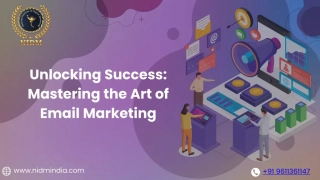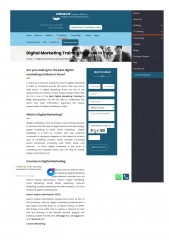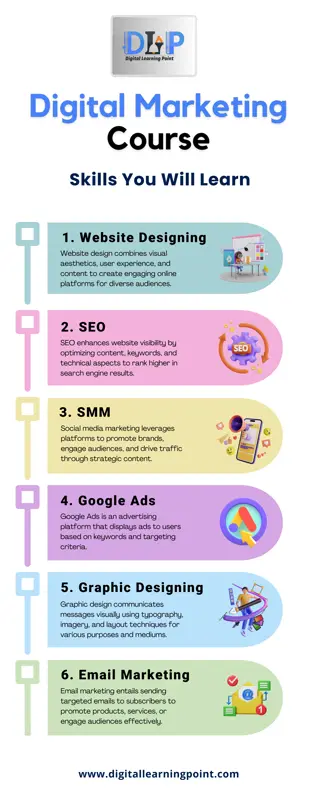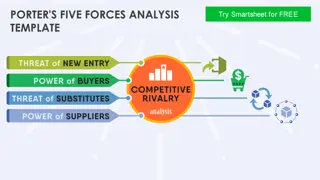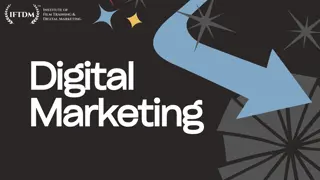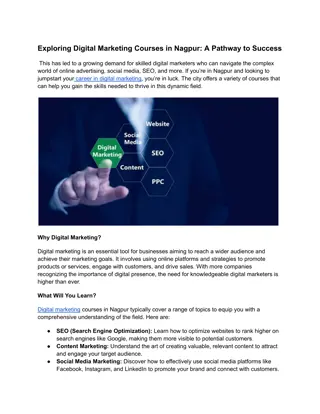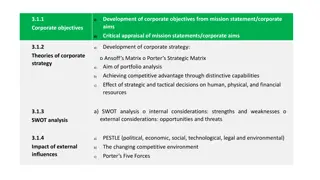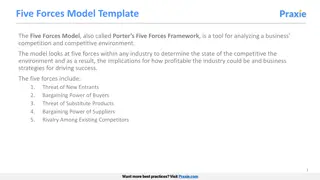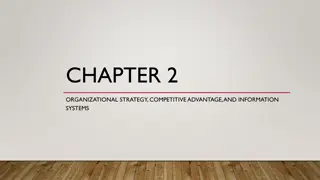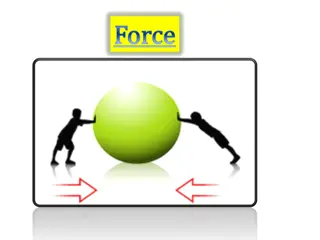Digital Marketing Strategy Analysis Using Porter's Five Forces
Analyze your industry using Porter's Five Forces to understand competitive rivalry, threats, buyer power, and supplier power. Learn how to assess the state of your industry and leverage the results for an effective digital marketing strategy.
Download Presentation

Please find below an Image/Link to download the presentation.
The content on the website is provided AS IS for your information and personal use only. It may not be sold, licensed, or shared on other websites without obtaining consent from the author.If you encounter any issues during the download, it is possible that the publisher has removed the file from their server.
You are allowed to download the files provided on this website for personal or commercial use, subject to the condition that they are used lawfully. All files are the property of their respective owners.
The content on the website is provided AS IS for your information and personal use only. It may not be sold, licensed, or shared on other websites without obtaining consent from the author.
E N D
Presentation Transcript
DIGITAL MARKETING STRATEGY TEMPLATE
Your Company Name One liner/Mission Statement
TABLE OF CONTENT Step 1: Understand Your Industry Step 2: Understand Your Competition Step 3: Understand Your Buyers Step 4: Understand the Digital Channels that will work for you Step 6: Understanding Marketing Metrics & Goals Step 5: Create Digital Marketing Strategy the 5D s
PART ONE UNDERSTAND YOUR INDUSTRY
Its worthwhile to analyze the state of your industry whether as a prospective new entrant or as an existing player in the game. One way to do this is with Porter s Five Forces Analysis. This method of studying an industry considers as the name suggests five different criteria and how high the power, threat, or rivalry in each area is. Below are the five forces in the analysis: Purpose of Our Research
1. Competitive Rivalry: This section asks how high the level of direct competition is in your industry. Ask yourself what other companies offer the same product or service that you do in the location that you do business in. While there may be another company offering the same thing you do, it only matters how much of a direct threat they impose on your share of the market for this analysis. Threat of New Entrants: This area explores how difficult it is to start a company or launch a product that could compete with yours. It also looks at barriers to entry whether those are resource-based, financial, or imposed by government restrictions. Threat of Substitution: For this criteria, think of the alternatives to your product or service. Keep in mind, these are not direct substitutes. Buyer Power: Buyer power looks at whether your market is a buyer s market or a seller s market from your company s perspective. If your product is at the mercy of the latest trend or a bargain-hunting coupon cutter, buyer power is high. Supplier Power: Lastly, supplier power considered how much suppliers influence the business. 2. 3. 4. 5. Purpose of Our Research
Threat of New Entrants Add your threats here Very High High Low Very Low Competitive Rivalry Supplier Power Buyer Power Very High High Very High High Low Very Low Very High High Low Very Low Low Very Low Threat of Substitution Very High High Low Very Low
Analyzing Your Results After you complete your analysis, take note of how often categories are marked as high or low. If there are more lows than highs, this is good! You have an opportunity to make an enormous impact in your market. If your highs outweigh your lows, consider what concrete actions you will have to take to overcome these potential threats and obstacles. Whether you re incumbent or a new business, these forces can change at any time, so staying on top of industry trends and getting a high-level look at your market is essential for long-term success. Analyzing Your Results
PART TWO UNDERSTAND YOUR COMPETITION
Once you understand your industry as a whole, dive into where you fit into that industry with a SWOT analysis. A SWOT analysis looks at a company s internal strengths and weaknesses and the external opportunities and threats within the market. Competing this analysis will highlight the direct areas of opportunity your company can start building on or working to overcome. Competition Research
Strengths: A companys strengths are its internal pros. Strengths are usually unique to that company, but can also be generally positive features that might be shared by another company. Weaknesses: Weaknesses are the internal faults that are within the company s control. This is not a time to mention the strengths of other industry players, but rather problems internally. Opportunities: Analyzing opportunities requires looking at the industry, market, and world as a whole to identify chances for a company to grow the business. Threats: Threats, like opportunities, exist outside of the company, but can be damaging to its success and profitability. This is where we consider government regulation, the influence of other companies, the economy, consumer trends, and more. Competition Research
Strengths: Weaknesses: Opportunities: Threats:
Use this analysis as a snapshot for your companys performance or potential performance. Don t just compare the amount of strengths and opportunities with the amount of weaknesses and threats weigh their importance to determine if you re currently in a good place or if you could be doing better. Analyzing Your SWOT Analysis
PART THREE UNDERSTAND YOUR BUYER
While you need to know where you stand in your industry, its ultimately worth knowing where you stand in the eyes of your customer and potential customers. Taking the time and effort to learn how your company or product will be perceived in the market is a vital action all businesses must routinely take. You will better understand: Facts about your target market. What matters to someone who would purchase from you. The demand for your product. The potential price points. Perception on competition Impressions of your branding. Buyer Persona
Buyer Personas Before you get to surveying your buyers, it s helpful to define them with buyer personas semi-fictional generalizations of who your target customers are. Understanding your buyer personas guides your survey construction to be more tailored to your intended audience. If you haven t established your buyer personas yet, use this free tool to get started. Buyer Persona
Buyer Persona Their Name Their Occupation/Title Their Age or Location Write up a brief synopsis of this buyer persona and why they may be a good fit to be a customer. If you re making a buyer persona from scratch, visit https://www.hubspot.com/make-my-persona and insert a screenshot of your persona.
PART FOUR UNDERSTAND YOUR DIGITAL CHANNELS
Your Company Goal We set out to find out (take it from here!)
Types of Digital Marketing Channels: Content Marketing: Blog, Quora, Lead Magnets, Guest Posts Search engine optimization (SEO): On-page & Off-page Social Media Marketing: Facebook, Instagram, Twitter, Pintrest, Linkedin Paid Social: Ads on Social Media Platforms Display Advertising: Banners ads on high DA websites Cold Email Outreach Marketing Influencer Marketing & PR Inbound Marketing: Marketing Automation & Funnel Optumization Most businesses need a combination of these channels to build your effective growth strategy. We like to break it down to Organic & Paid Channels for further clarity on showing effectiveness of these campaigns. Digital Marketing Channels
ORGANIC GROWTH Organic growth channels brings in slow growth to a business but is the most valuable and trusted source, especially when you are looking to build a quality lead pipeline. Choose from these channels below (based on resources & budgets): Digital Marketing Channels
Service What it means Growth Metrics Resources Needed Budget Needed On-page Optimization Making your website & landing pages SEO - friendly & mobile friendly Increase traffic Decrease Bounce Rate Designer HTML Developer SEO Strategist Keyword SEO Showing up your web pages and landing pages for high volume search keywords on google Increase Traffic Lead generation SEO Strategist SEO Team Content Marketing Creating high quality content for blogs, social posts, emails and ads on your blog Increase Traffic Increase subscriptions Content Writer SEO Strategist Designer Inbound Marketing Nurturing Leads to conversion to retention via marketing automation, funnel optimization and retargeting Boost ROI Decrease CPA s Increase Revenue Decrease Sales Cycle Build High Quality Sales Pipeline Inbound Marketing Expert MarTech Expert Content Writer Designer Social Media Marketing Promote your content via social media platforms by create engaging, inspirational & fun content to build your brand presence and reach new audience group Build Social Proof Reach New Audience Build Brand Content Writer Social Media Manager Designer Guest Posts & Backlinks Write for other high DA websites and get backlinks to your website Increase organic presence Increase DA Content Writer SEO Strategist Email Marketing Cold Email Outreach Lead Generation Content Writer Digital Marketer Digital Marketing Channels
PAID GROWTH This is the fastest source for lead generation and sales for any business. It is the backbone of growth for all businesses to start seeing revenue growth. Choose from these channels below (based on resources & budgets): Digital Marketing Channels
Service What it means Growth Metrics Resources Needed Budget Needed Paid Social Running ads on facebook, instagram, pinterest, quora, linkedin Increase traffic Lead generation Designer HTML Developer PPC Strategist Display Advertising Banner ads on high DA websites via google or platforms like taboola Increase Traffic Lead generation Designer HTML Developer PPC Strategist Search Advertising Keyword search on google and bing Increase Traffic Lead generation Designer HTML Developer PPC Strategist Remarketing Retargeting leads via email, push and social ads to get them to convert Boost ROI Decrease CPA s Build High Quality Sales Pipeline Inbound Marketing Expert MarTech Expert Content Writer Designer Paid links & PR Promote your content via paid sources and media Build Social Proof Increase Traffic Content Writer Social Media Manager Influencer Marketing Product endorsement by industry influencers Build Brand Build Social Proof Lead generation Content Writer Social Media Manager Digital Marketing Channels
PART FIVE UNDERSTAND YOUR MARKETING METRIC & GOALS
Digital Marketing KPIs or Key Performance Indicators are quantifiable goals which help you to track and measure success. KPIs are a useful way for Business owners to see the actual results of their digital marketing campaigns Marketing Metrics Sales Metrics Traffic Conversion rate from leads to opportunities ROI Conversion rate from Qualified leads to sales Conversion By Source, Medium, Channel Deal win rate ROI reporting Leads Cost Per Acquisition Average days to close Customer Lifetime Value Monthly recurring Revenue Followers, Likes, Shares, Comments Profit Percentage Marketing Metrics
All digital marketing campaigns needs to achieve set marketing goals which are generally derived from the business goals. Marketing Goals Business Goals Reduce CPA Increase Revenue Improve ROI Increase Profit Percentage Followers, Likes, Shares, Comments New Customers Increase Organic Traffic Build Brand Lead Score High Quality Pipeline Customer lifetime Value Repeat Business Marketing Metrics
DataPoint 4x Customer lifetime Value If your digital marketing strategies are focused on increasing your customer lifetime value i.e. repeat business, it automatically sets you up for continuous growth. What Was the Most Important Data Point?
PART SIX CREATING YOUR DIGITAL MARKETING STRATEGY
Every Digital marketing Strategy Comprises of the below 5Ds: 1. Digital Technology 2. Digital Data 3. Digital Channels 4. Digital Metrics 5. Digital Devices Let s understand what each of these means and how together they build a digital marketing strategy that will improve your digital presence and boost conversions Digital Marketing Strategy
Digital Technology: The most important part of the digital strategy is the technology. Marketing today is driven by the right kind of technology and tools to enhance and upgrade your marketing efforts that show highly effective results. The first step is to choose your Marketing Technology aka MarTech stack. Here are the tools you need: Customer Data Platform: CDP like Segment allows you to track a customer following GDPR guidelines Marketing Automation: Platforms like Hubspot are great automation platforms that helps you setup inbound marketing to increase your customer retention rates and build a high quality sales pipeline. Hubspot also takes the headache off social media management campaigns Customer Relationship Management: CMS systems like salesforce are most imperative to start seeing quality leads and conversions Analytics & Metrics: Tools like Google analytics, Mixpanel and Amplitude helps in giving you the right picture Digital Marketing Tools: Keyword search tools, Content analysis tools and various other SEO tools needs to be shortlisted Digital Marketing Strategy
Digital Data: Digital data normally consists of audience profiles and engagement patterns with businesses. This aspect is captured by typography setup within your chosen digital technology that focuses on building interactive experiences across a wide range of digital channels and your digital channels. Digital Channels: Digital channels are another component that involves the analysis of the preferred platforms to target the audience. Evaluate from the digital marketing channels explained above to build your digital marketing strategy. A collection of paid, owned, and earned channels utilize to build engagement with the target market through several ways such as advertising e-mails, messaging, search engines, and social networks. Purpose of Our Research
Digital Metrics: identifying business goals and setting up marketing metrics to fulfill your goals is the honest way to see how your campaigns perform. Digital Devices: It mainly focuses on the target audience s interaction and engagement on websites and mobile applications using a combination of connected devices. These devices may include smartphones, tablets, desktop computers, TVs, and gaming devices. Hence its most important to make your websites and landing pages seo-friendly and mobile friendly Purpose of Our Research
PART SEVEN How To Start? A Summary
1. 2. 3. 4. 5. 6. 7. 8. 9. Build your unique positioning & messaging Build your buyer personas. Identify your business goals & marketing goals Prepare the list of digital marketing tools you'll need. Evaluate your existing digital channels that work for you Audit and plan your owned media campaigns. Analyzing your digital marketing strategy s past success and failures Identify Your Means (& Stick to Your Budget) Measure and monitor the performance of your digital marketing strategy and to change elements where needed. 10. Setup Inbound Marketing 11. Understand the Digital Sales Funnel 12. Focus on Blogging 13. Focus on Mobile Optimization & SEO Friendly Content 13 steps to create the digital marketing strategy



